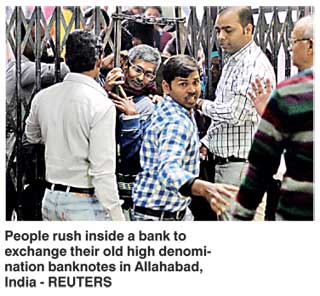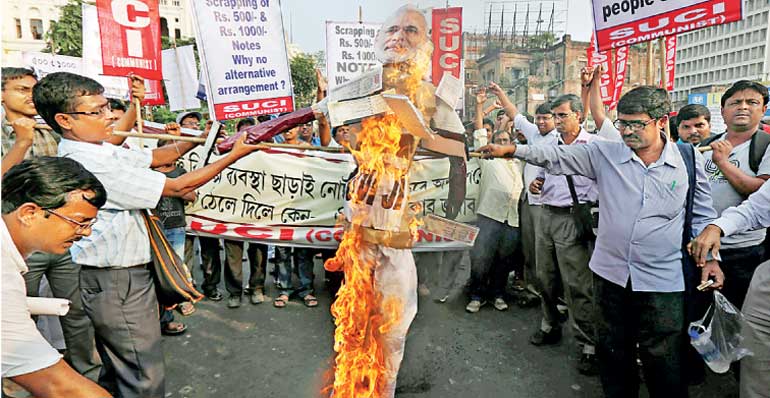Monday Feb 23, 2026
Monday Feb 23, 2026
Tuesday, 15 November 2016 00:01 - - {{hitsCtrl.values.hits}}
Reuters: India’s Government increased the limit on cash withdrawals from bank accounts on Sunday to calm public anger as millions of people clamoured for new rupee bills after a shock abolishment of large denomination notes.
Large crowds were again gathered at banks across the country trying to change 500 and 1,000 rupee bills, demonetised by the Government on Tuesday, in an effort to crack down on corruption.
Indian banks received INR 3 trillion of INR 500 and 1000 notes over the last four days, the Finance Ministry said in a statement, in a surge in liquidity in the banking system. Short term interest rates are expected to fall as a result. The Government relaxed cash  withdrawal limits including removing a per-day cap of INR 10,000, increasing the weekly limit to INR 24,000 from INR 20,000 and allowed exchange of bills over the counter at banks to reach INR 4,500 instead of INR 4,000.
withdrawal limits including removing a per-day cap of INR 10,000, increasing the weekly limit to INR 24,000 from INR 20,000 and allowed exchange of bills over the counter at banks to reach INR 4,500 instead of INR 4,000.
The move to demonetise the large bills is designed to bring billions of dollars’ worth of cash in unaccounted wealth into the mainstream economy, as well as dent the finances of Islamist militants who target India and are suspected of using fake INR 500 notes to fund operations.
The banned notes made up more than 80% of the currency in circulation, leaving millions without cash and threatening to bring much of the cash-driven economy to a halt.
The Reserve Bank of India said small denomination currency notes were available with both the Central Bank and with other lenders.
People “need not be anxious” and should not hoard bank notes because “cash is available when they need it”, the RBI said in a statement. It also asked banks to provide details of cash withdrawn and exchanged daily, in contrast to fortnightly, to provide a better idea on circulation.
The measures came as people complained of lack of access to their accounts despite hours of waiting at banks as well as over the non-functioning of tens of thousands of ATMs not yet reconfigured for the new series of smaller-sized INR 2000 bills.
The Times of India reported that the Central Bank’s office in the Western city of Ahmedabad was handing out coins in return for the old notes because it didn’t have enough valid tender.
It showed a picture of a man emerging with plastic packets of coins of INR 10, underlining the banking system’s struggle to make the transition to the new series of notes.
Prime Minister Narendra Modi, facing criticism from opposition groups for putting ordinary people into difficulties, promised further steps to rid the country of graft.
“I know the forces up against me, they may not let me live, they may ruin me because their loot of 70 years is in trouble, but I am prepared,” he said in a speech in western seaside resort of Goa. The decision to demonetize the high value notes was planned in secrecy over the past 10 months, he said.
Modi came to power in 2014 with a mandate to boost economic growth and fight the corruption that taints large parts of India’s political and business life.
 Activists of Socialist Unity Centre of India (SUCI) burn an effigy of Prime Minister Narendra Modi during a protest against the government’s decision to withdraw 500 and 1000 Indian rupee banknotes from circulation, according to a media release, in Kolkata, India, 14 November, 2016 - REUTERS
Activists of Socialist Unity Centre of India (SUCI) burn an effigy of Prime Minister Narendra Modi during a protest against the government’s decision to withdraw 500 and 1000 Indian rupee banknotes from circulation, according to a media release, in Kolkata, India, 14 November, 2016 - REUTERS